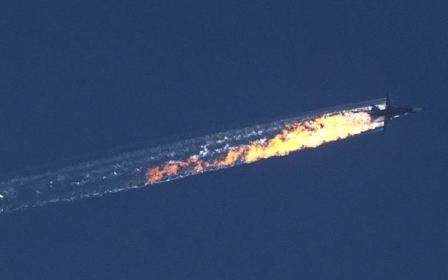Calls for calm amid tensions between Turkey, Russia

Ankara and Moscow were urged to de-escalate tensions after Turkey shot down a Russian war plane on the Syrian border on Tuesday.
NATO chief Jens Stoltenberg said the military alliance stood by member Turkey after the incident, but echoed appeals for calm from other world leaders as fears grow of clashes between coalition and Russian planes in the skies over Syria.
"We stand in solidarity with Turkey and support the territorial integrity of our NATO ally, Turkey," Stoltenberg said after an emergency meeting of all 28 members requested by Ankara.
"Diplomacy and de-escalation are important to resolve this situation," added.
Meanwhile, UN Secretary-General Ban Ki-moon called for a "credible and thorough review" of the incident to establish what happened and ensure it does not happen again.
US President Barack Obama called for calm, saying his top priority "is going to be to ensure that this does not escalate".
President Francois Hollande, who was in a visit to Washington, joined Obama in warning against any escalation.
Turkey's military said the fighter was shot down by two of its F-16s after it violated Turkish airspace 10 times within a five-minute period.
Turkey also recently warned Russia against violating its airspace.
Turkey has expressed anger at Russia's bombing campaign, saying it is aimed at buttressing the government of Syrian President Bashar al-Assad and has displaced thousands of Turkmen Syrians, an ethnic minority in the area and strong allies of Ankara.
The Turkish ambassador to the United Nations Halit Cevik said in a letter to the Security Council that two Russian planes had flown a little more than a mile into Turkish airspace for 17 seconds.
But Moscow bitterly criticised Turkey for downing the Su-24 plane, which it insisted was in Syrian airspace, and claimed that one of the two pilots who ejected from the craft was killed by gunfire from the ground as he descended.
Russian President Vladimir Putin branded the shooting down of the aircraft a "stab in the back committed by accomplices of terrorists", warning: "The tragic event will have serious consequences for Russian-Turkish relations."
Putin said the plane fell in Syrian territory four kilometres from the border and "did not in any way threaten Turkey".
Russian Foreign Minister Sergei Lavrov scrapped a planned visit to Turkey on Wednesday, and warned Russians against travelling to Turkey.
He said the risk of attacks "is no less of a threat than in Egypt," where all 224 people onboard a Russian passenger jet were killed in October in an attack claimed by the Islamic State.
Russia's Moskva guided missile cruiser will now be stationed near Latakia, on Syria's Mediterranean coast, and all bombers in Syria will now be escorted by fighters, Russian military spokesman General Sergei Rudskoi said, adding the shooting down would have the "the gravest consequences".
"All targets representing a potential threat to us will be destroyed," he warned.
This is the first time Turkey has shot down any Russian planes since Moscow started airstrikes in September, and is the first time a NATO member country has downed a Russian jet since the 1950s.
Damascus, an ally of Moscow, denounced the incident as "flagrant aggression" against Syrian sovereignty.
A US military spokesman in Baghdad confirmed Turkey had warned the Russian jet 10 times, without response, before shooting it down but said it was not immediately clear on which side of the border the jet had been flying.
The incident comes as Russian and Syrian jets wage a heavy bombing campaign against targets in northern Syria.
Meanwhile, Turkey's President Recep Tayyip Erdogan and Obama on Tuesday agreed on the need to reduce tensions, the Turkish presidency said.
"They were in accord on the importance of de-escalating tensions and making arrangements to prevent a repeat of such incidents," the Turkish presidency said in a statement following telephone talks between the two leaders.
The statement said that Obama had emphasised in the telephone talks that Turkey's right to defend its sovereignty was "supported by the United States and NATO".
They also expressed their commitment to a bringing about a transitional political process for peace in Syria and joint determination to continue the fight against Islamic State (IS) militants, the statement added.
Stay informed with MEE's newsletters
Sign up to get the latest alerts, insights and analysis, starting with Turkey Unpacked
Middle East Eye delivers independent and unrivalled coverage and analysis of the Middle East, North Africa and beyond. To learn more about republishing this content and the associated fees, please fill out this form. More about MEE can be found here.




